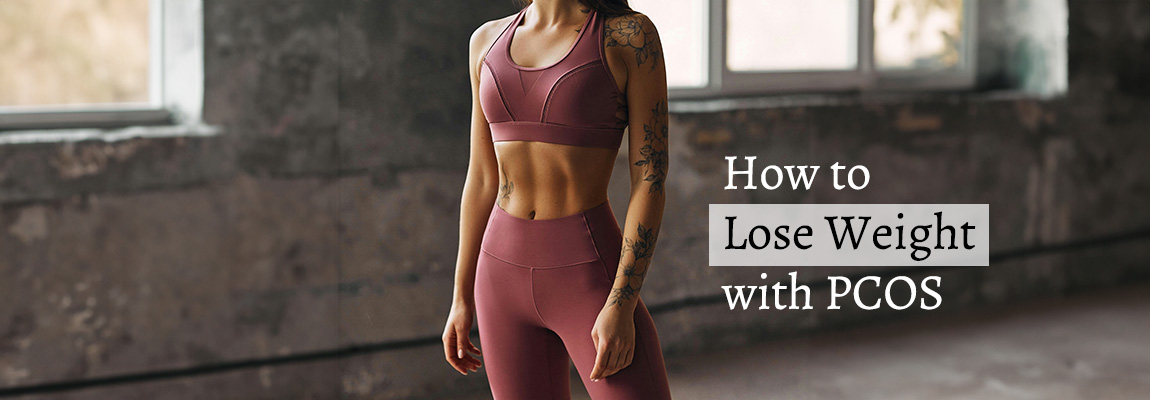
PCOS, or Polycystic Ovary Syndrome, is a hormonal disorder that is commonly found in women of reproductive age. It happens when a woman’s hormones are out of balance, leading to irregular periods, excess hair growth, acne, and sometimes weight gain.
Women suffering from PCOS have to contend with weight gain, which can become a constant struggle. Between 4% and 20% of reproductive-age women have PCOS. Women with PCOS might also have small cysts on their ovaries. It can affect fertility and increase the risk of other health problems like diabetes and heart disease.
The hormonal imbalances, insulin resistance, and inflammation associated with PCOS can pose challenges for weight loss efforts. Nonetheless, even a modest weight reduction of around 5% can enhance insulin sensitivity, hormone balance, menstrual regularity, fertility, and overall well-being among individuals with PCOS. Below are five valuable tips to aid in weight loss while managing PCOS.
5 Helpful Tips to Lose Weight with PCOS
PCOS is an endocrine disorder that affects hormonal balance, which is responsible for several bodily functions that impact weight, such as hunger sensations, energy metabolism, stress responses, and more.
However, evidence suggests that even modest weight reduction can alleviate PCOS symptoms. To support your path to better health, here are the following steps for success.
1. Balance Your Diet
One diet may not work for everyone. Some experts suggest that people who want weight loss should focus on the intake of green vegetables, fruits, protein, and healthy fats and should cut down on carbohydrates and sugar in their diet. There are several PCOS patients who are struggling with elevated blood sugar and insulin resistance, so making these small changes can also help people at risk of developing type-2 diabetes.
Here are some of the tips for weight loss and tackling other symptoms of PCOS.
- Add Protein to Your Diet – Increasing your protein intake has been shown to enhance weight loss efforts, which is particularly beneficial for people managing PCOS. Incorporate high-protein foods such as eggs, meat, nuts, dairy, and seafood into your daily meals to support your weight loss journey and overall health.
- Eat Plenty of Fibre – A diet rich in fiber can be beneficial for individuals managing PCOS, as it has the potential to decrease insulin resistance, body weight, and excess body fat.
- Reduce Carbs and Eat Healthy Fats – To manage PCOS, focus on eating fewer carbs and including healthy fats in your meals. This can help balance your hormones and control your weight more effectively.
2. Do Exercise Regularly
Experts suggest that 30 minutes of moderate exercise is a must for people who are suffering from PCOS. Performing regular exercise can help in healthy weight management and for all aspects of health and overall wellbeing.
A few studies indicate that people with PCOS lose less fat compared to those who are not diagnosed with PCOS. however, the exercise routine still has several benefits, such as relieving many symptoms of PCOS, good results in loss of belly fat, improvements in insulin sensitivity, etc.
3. Avoid Extreme Diets and Strenuous Exercises
This may seem like a path to get fast results, but this can actually cause more harm than good.
Firstly, drastically reducing your daily calorie intake can lead to nutritional deficiencies that may also harm your overall health. Studies also indicate that extreme calorie restriction often results in weight regain, especially for those when old eating habits return.
Secondly, strenuous activities and exercises without appropriate dietary adjustments may not yield the expected weight loss outcomes. One study revealed that exercising without dietary changes didn’t result in significant weight loss. Moreover, too much exercise can increase the risk of injury, especially when exceeding one’s physical capabilities.
While adopting healthy eating habits and regular exercise are crucial for weight management, opting for gradual and consistent changes are important to achieve best results in the long run.
4. Be Patient with Your Progress
While losing weight can take more time for people with PCOS compared to someone without hormonal imbalances. It might be a little difficult, but not impossible. Slow progress can feel discouraging; following a healthy lifestyle has several effective benefits you might not know.
Eating a balanced diet and regular exercise can decrease the risk of developing chronic conditions such as heart problems, Type 2 diabetes, high cholesterol, high blood pressure, sleep apnea, and infertility. In addition, considering medications, regular exercise, and a balanced diet can also aid in improving some common symptoms of PCOS, like acne, excess hair growth, and heavy periods.
5. Consider Medications
Although there is no cure for PCOS, medications can aid symptom management, often in combination with lifestyle adjustments like exercise and healthy eating. Common medications include blood sugar regulators like Metformin to combat insulin resistance, oral contraceptives to regulate hormones and manage irregular periods, and weight management drugs recommended by doctors when diet and exercise alone aren’t effective.
Conclusion
PCOS is a complex condition that affects many women a little differently. If you are suffering from PCOS and struggling with weight and other symptoms, it is advised to consult with a reputed PCOS specialist who will help you to diagnose and treat PCOS to preserve or restore fertility, reduce symptoms, and prevent complications that can develop in women with PCOS from adolescence to the postmenopausal period.